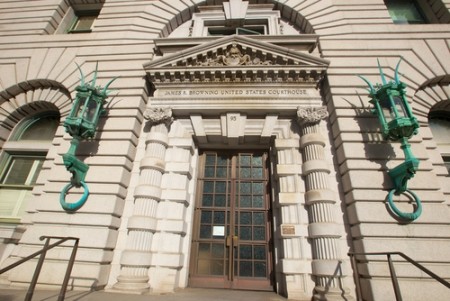ABA files 9th Circuit amicus brief supporting Hawaii federal court's injunction against travel ban

9th U.S. Circuit Court of Appeals.
At February’s midyear meeting, the ABA House of Delegates voted to adopt Resolution 10C (PDF), urging President Donald Trump not to use religion or nationality as a basis for barring otherwise eligible people from entering the United States. The resolution expressed concerns about the legality of the president’s original executive order banning travel by people from majority-Muslim countries.
Acting on that vote, the ABA on Friday filed its second amicus brief (PDF) strongly opposing the travel ban, now on its second iteration, this time in the San Francisco-based 9th U.S. Circuit Court of Appeals. The brief argues that the plain language of the Immigration and Nationality Act and the rules of statutory interpretation support upholding a nationwide injunction against the travel ban.
“As the voice of the legal profession, the ABA has a special interest and responsibility in safeguarding the integrity of our legal system,” the brief says. “Preserving and promoting robust judicial review of executive action goes hand-in-hand with these responsibilities, particularly where executive action encroaches on the Constitution’s fundamental protections or important statutory protections.”
Like Wednesday’s amicus brief in the 4th U.S. Circuit Court of Appeals case challenging the travel ban, International Refugee Assistance Project v. Trump, the brief in Hawaii v. Trump relies heavily on language in the 1965 Immigration and Nationality Act expressly banning discrimination on the basis of race or national origin in issuing immigrant visas. The brief says this issue was not addressed in the Hawaii district court’s opinion, but should be considered because it substantially limits the president’s power.
For one thing, the brief says, the government has argued that a provision of the 1952 Immigration and Nationality Act permitting the president to exclude classes of people he believes are detrimental to the interests of the United States should override the 1965 discrimination ban. “This argument makes no sense” under ordinary rules of statutory interpretation, the brief says, and nothing in the 1965 law suggests an intention to make an exception.
Furthermore, the brief says, there is no legitimate basis for using the 1952 provision to stop visitors from the six majority-Muslim countries affected by the second travel ban. Prior presidents have used it as a sanction against countries violating international law or Americans’ rights; this president is asking to use it to exclude people based on their national origin alone. And the administration has cited no evidence that people from those countries pose a special threat, the brief says.
Finally, the brief takes exception to the government’s argument that the 1952 Immigration and Nationality Act gives the president “virtually unlimited and unreviewable power”—an argument that fell flat during a prior trip to the 9th Circuit. Statutory authority is subject to constitutional and congressional limits, the brief says, even during wars.
Oral arguments in Hawaii are scheduled for May 15 in Seattle, a week after oral arguments in the 4th Circuit case. Though both cases challenge injunctions against the executive order, the injunction at issue in International Refugee Assistance Project stops only enforcement of the order’s ban on travel from the six specified nations, whereas the one in Hawaii forbids enforcement of the entire order.



